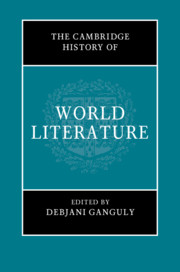Book contents
- The Cambridge History of World Literature
- The Cambridge History of World Literature
- Copyright page
- Contents
- Figures
- Contributors
- Acknowledgements
- Introduction
- Part I Genealogies
- Part II Thinking the World
- 9 Does Poetry Make Worlds?
- 10 Ecosystems of World Literature
- 11 From World Literature to World Philosophy and Back Again
- 12 Saving Europe through Weltliteratur: The Case of Victor Klemperer
- 13 Viśvasāhitya: Rabindranath Tagore’s Idea of World Literature
- Part III Transregional Worlding
- Part IV Cartographic Shifts
- Part V World Literature and Translation
- Part VI Poetics, Genre, Intermediality
- Part VII Scales, Polysystems, Canons
- Part VIII Modes of Reading and Circulation
- Part IX The Worldly and the Planetary
- Index
- References
12 - Saving Europe through Weltliteratur: The Case of Victor Klemperer
from Part II - Thinking the World
Published online by Cambridge University Press: 17 August 2021
- The Cambridge History of World Literature
- The Cambridge History of World Literature
- Copyright page
- Contents
- Figures
- Contributors
- Acknowledgements
- Introduction
- Part I Genealogies
- Part II Thinking the World
- 9 Does Poetry Make Worlds?
- 10 Ecosystems of World Literature
- 11 From World Literature to World Philosophy and Back Again
- 12 Saving Europe through Weltliteratur: The Case of Victor Klemperer
- 13 Viśvasāhitya: Rabindranath Tagore’s Idea of World Literature
- Part III Transregional Worlding
- Part IV Cartographic Shifts
- Part V World Literature and Translation
- Part VI Poetics, Genre, Intermediality
- Part VII Scales, Polysystems, Canons
- Part VIII Modes of Reading and Circulation
- Part IX The Worldly and the Planetary
- Index
- References
Summary
The overwhelming majority of works on world literature hitherto have been written by Western scholars. The almost endemic neglect of literatures other than European or Western in these writings over the last twenty years or so has drawn heavy critical fire. Usually, such Eurocentrism has been seen as the result of either ignorance on the part of these scholars or on an ingrained cultural bias. However, a deliberate concentration on European literature, or even on a very restricted version of the latter, may also be a strategic choice in particular times and under particular circumstances. A 1929 essay by the German literary scholar Victor Klemperer illustrates my point.
- Type
- Chapter
- Information
- The Cambridge History of World Literature , pp. 246 - 260Publisher: Cambridge University PressPrint publication year: 2021



